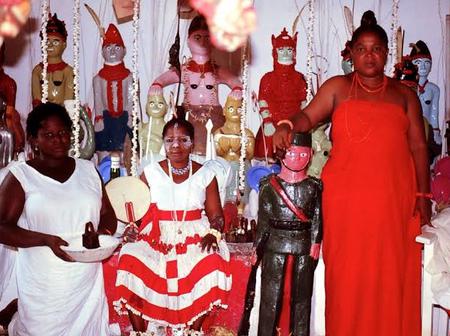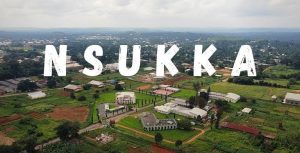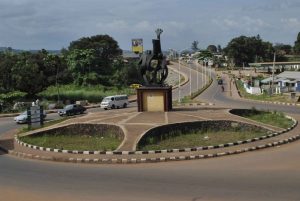
Initiation & Priestess hood Of Inyama Of Enugu-Ezike:
Priests and priestesses serve as a bridge between humans and the gods in traditional Igbo society and also in other cultures across Nigeria and Africa. These traditional “prophets” are revered by the people and frequently behave erratically; some of them don’t cut their hair and seem obviously deranged to people who don’t understand how these things work and even to any outsider. They are venerated by the populace and undertake rituals to heal the ill and avoid disasters for their various communities.
In Enugu-Ezike, Nigeria, these priestesses are known as Inyama, and they are thought to have received a supernatural calling to serve various gods. It is believed that young maidens who act strangely in public are possessed by the Inyama. Those who refuse the summons to serve the deity risk going insane and suffering from disasters.
Religion was, and continues to be, a major factor in everyone’s life in pre-colonial Enugu-Ezike. The people have a fervent belief in the almighty God, who created everything in the world and everything above it. God is all-knowing to them. He goes by the name Ezechukwu-oke or Ezechitoke, depending on the situation.
Before the arrival of Christianity, the inhabitants of Enugu-Ezike worshiped a variety of gods that they believed to be representatives of Ezechukwu-oke (God). Numerous deities are revered and even feared by the populace. The Enugu-Ezike people believe in an individual “chi” or personal god who is in charge of determining each person’s fate in the world. They also revere, worship, and offer libations to their ancestors.
“Attama” is a term used to refer to priests who are in charge of the gods. Their female equivalents, known as Inyama, are likewise revered since it is said that they may serve as a mediator between people and the spirit realm, treat people of illnesses, and anticipate danger.
The Priestess
The Inyama cult has a long history. The cult’s origins are unclear, although according to the locals, it has existed for at least as long as the town has. Only females are thought to be possessed by Inyama, a spirit energy; those who are in its possession are known as Inyama. It is also believed to be hereditary (Oluwa). Both young girls and elderly women can be possessed by the Inyama ghost. If a young girl is possessed, however, she is maintained in abeyance until she is mature after sacrifices have been made. A girl who was possessed was typically referred to as Ogbanje.
On the other hand, an older woman that is possessed by the spirit receives the “Echi” (anklet) from the chief priest which she wears as a mark of her membership. Refusal to accept the call of Inyama brings misfortunes and ill luck and other grave consequences on the family concerned, such as sickness, barrenness, and chaos among others. For the young girl, it manifests between the age of six months and seven months with several signs like frequent malaria, convulsion, and other strange signs (Elua). An older woman who is affected by the spirit is forced to scream her way to the chief priest in charge of the relevant deity.
The initiation process
The religion of Inyama requires rigorous practices and significant financial investment for initiation. Before being accepted into the cult, the new initiate must go through a number of spiritual purification procedures. An Inyama priestess shouts a caution, saying that in order to appease the gods, one must take care during the process.
The potential candidate invites all the Inyama priestesses in her town and beyond once she has saved up enough money to pay for a pricey feast.
The act is carried out by older or more experienced priestesses and priests whose job is to install the shrine or personal god (Adema –spirit calabash) for the prospective candidate in her home. Fowls, goats, and other sacrificial items stipulated are offered on the new altar and the new priestess pours a libation to the spirit.
The sacrificed animals required for initiation include white chickens, goats (Ewu Igbo), chicken, palm wine, kola nuts (Oji), Oodo (powdered like and always yellow), Nzu (white chalk), yams, and ashakpa (cowries), among other things.
The potential candidate sweeps the shrine each morning for a few days prior to the final initiation using branches from a certain thorny plant. She would familiarize herself with the shrine’s rituals in this way. They receive training in this as well.
The duties of the priestess
Priestesses of the Inyama sect have acquired a wide range of knowledge about how to interact with the spiritual realm for the good of society through revelations, education, and initiation. They help people in all facets of their lives. They provide guidance and advance all-encompassing solutions to the plethora of human problems.
The priestesses of Inyama use herbs to treat patients and care about their well-being as a whole. They do, however, also face with setbacks. They assist in identifying the cause(s) of an illness, determining its type, and administering the necessary treatments. The priestesses also assist people in achieving success in a variety of endeavors.
The Nsukka Igbo, particularly Enugu-Ezike, seem to be an exception to the aforementioned position. There are priestesses in this place whose reputation have grown to the point where they can join the masquerade cult at any time with no repercussions. They were referred to as “OYIMA” and still are (friends of the spirits). Lolo Celestina in Ugwu-achara Nsukka and Lolo Ngozi Idoko in Ikpamaodo Enugu Ezike, for instance, are two excellent instances of these ladies who are regarded in society as Inyama priestesses.
Through their emissaries, known in Enugu-Ezike as Inyama, the Supreme Being, minor deities, ancestors, and unseen realities affect man and solicit attention from him. They act as a conduit between the physical world and the spiritual realm. They are members of the community who make an effort to understand human issues properly and offer ritualistic solutions.
They provide guidance and answers to a wide range of issues. They made a significant contribution to the pre-colonial Enugu-Ezike society’s growth. However, the roles and functions of this organization have been negatively impacted by the influence of Christianity, urbanization, industrialization, and modern medicine, among other factors. As the feelings associated with it fade, their followers and clients are correspondingly drastically declining.


